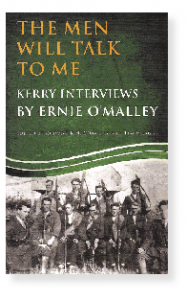The men will talk to me: Kerry interviews by Ernie O’Malley
Cormac K.H. O’Malley and Tim Horgan (eds)
(Mercier Press, €19.99)
ISBN 9781856359528
 The title of this collection conveys the point that, as a highly respected IRA veteran, Ernie O’Malley had unique access to his former comrades when in the late 1940s and early 1950s he interviewed nearly 500 of them about their bygone revolutionary days. His field notes have been held in UCD since the mid-1970s and are recognised as essential sources for historians of the Irish revolution. With Mercier Press’s publication of a selection of his Kerry interviews (plus a volume on Galway and another on Mayo forthcoming), a sample of O’Malley’s Herculean labours in the field is now available in print.
The title of this collection conveys the point that, as a highly respected IRA veteran, Ernie O’Malley had unique access to his former comrades when in the late 1940s and early 1950s he interviewed nearly 500 of them about their bygone revolutionary days. His field notes have been held in UCD since the mid-1970s and are recognised as essential sources for historians of the Irish revolution. With Mercier Press’s publication of a selection of his Kerry interviews (plus a volume on Galway and another on Mayo forthcoming), a sample of O’Malley’s Herculean labours in the field is now available in print.
The series editor, Cormac O’Malley (well known for his efforts to preserve his father’s legacy), and Tim Horgan, who transcribed these interviews, have preserved the often rough character of the originals but have annotated them in order to clarify oblique points, identify people and events, and otherwise guide the reader through the tangled thickets of personal experience, local history and memory. While the resultant clutter of footnotes, bracketed information, parenthetical asides and sentence fragments might be a little off-putting to some readers, the richness of the recollections that O’Malley documented—whether approached as military or social history, folklore or, indeed, memory—will reward close, careful reading.
The volume consists of eighteen interviews, split between North Kerry/Tralee and South/West Kerry, though a Tipperary man slips in—later IRA chief-of-staff Andy Cooney, who was sent to Kerry as an IRA organiser. Given the strength of anti-Treaty sentiment in Kerry (and O’Malley’s own allegiances), it is unsurprising that the majority of men interviewed fought against the Free State. Nevertheless, the collection also includes interviews with a Free State Army veteran and another Treaty supporter, both of whom speak candidly about repressive Free State tactics in the area. Despite the masculine title, there is actually one woman in the collection: Mary ‘May’ Dálaigh, a member of a prominent republican family in Firies whose home was a regular stop for on-the-run Volunteers, as well as for police and army raiding parties. Mini-biographies of interviewees, a chronology and some photographs and illustrations round out the book.
Of the eighteen interviewees selected for inclusion, only half a dozen also submitted witness statements to the contemporaneous Bureau of Military History (BMH)—although, in keeping with the boundaries of that project, all but one ended their BMH accounts at the Anglo-Irish truce, thus eliding their extensive activism in the Civil War. O’Malley’s interviews can therefore be seen as a shadow project or counter-archive to the government’s efforts, highlighting the revolutionary activities of primarily anti-Treaty Volunteers who, often for political reasons, did not participate in the state’s efforts to (rather selectively) historicise and commemorate its revolutionary origins. Moreover, the candid conversations collected by O’Malley provide an almost inverse focus on the traumatising 1922–3 conflict. Not since Dorothy Macardle’s classic Tragedies of Kerry (1924) has the republican experience of violence and repression at the hands of the Free State received such sustained and vivid expression. But whereas Macardle preferred religiously infused, veiled language to narrate Free State atrocities in Kerry in March 1923, O’Malley’s interviews often provide more explicit and chilling details of a wider range of extra-judicial murder and almost casual brutality against prisoners. Intriguingly, within John Joe Rice’s interview, Ernie O’Malley himself offers a rare parenthetical aside expressing scepticism about the reliability of the recurrent allegations of abuse against two of the most notorious figures, intelligence officer David Neligan and Paddy Daly, O/C of the Kerry Command (p. 293).
Apart from the events of the Civil War, the interviews illuminate a host of significant issues and themes: early Volunteer organisation in Kerry, the often tense relationship between Kerry battalions and IRA GHQ (based, in part, on the latter’s efforts to replace Tralee leader Paddy Cahill), the intelligence war and the shooting of spies, and many significant local episodes in the Tan War. While the Kerry IRA has been portrayed as not having militarily blossomed out ‘[until] . . . the Civil War’ (Cooney, p. 178), there is much evidence here of widespread and even large-scale operations before the 1921 truce, including a pre-Soloheadbeg shooting of RIC constables, the first killing of a ‘Black and Tan’, the earliest use of a trap mine, and ambushes at Annascaul, Headford Junction, the Bog Road at Rathmore and Castlemaine, to name but a few. While most of these events are reconstructed in Kerry’s fighting story and the work of T. Ryle Dwyer, the recurring references to the same events and people across these interviews create a rich tapestry of overlapping and sometimes contradictory accounts and perspectives that will help readers to appreciate the complex nature of the evidence from which historians construct their narratives.
Alongside the digitisation and on-line release of the BMH collection, The men will talk to me suggests that enhanced public access to the vast archives on the revolution might prove to be one of the more significant fruits of the ‘decade of commemorations’ that has just begun. HI
Gavin Foster is Assistant Professor of Modern Irish History in the School of Canadian Irish Studies, Concordia University, Montreal.

